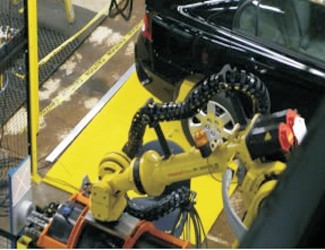Background
Typically, conveyors can only position vehicles approximately, and the vehicle's wheels can freely rotate, tilt, and turn. In an automotive equipment production line, tightening the nuts on two wheels within approximately 40 seconds is a very challenging task. If the location of the nut with ears is known, a robot can easily determine the position of the nut placer to provide the required torque, thus completing the entire nut assembly process quickly and automatically.

System Overview
The vision application relies on two vision systems to find the position of each wheel. It uses circular locators to accurately determine the axis's center. Boundary tools are used to inspect the features of the wheel rim center to determine the angle of wheel rotation. After taking the first image, a laser draws a cross on each wheel. Then, the first laser turns off, and a second laser draws another cross from a different angle to capture the second image. Boundary tools are then used to check the crosses in each image. The coordinates of the crosses are transferred to the control program, which calculates the angle of wheel rotation and tilt by differences between the crosses.
The system then communicates this information to the robot's controller, which rotates the nut placer and tightens the nut to the appropriate torque in just a few seconds.
Results
The automation of this application frees two workers from difficult and high-pressure work, allowing them to engage in other more efficient tasks.
Application Area
Various robotic guidance applications, component recognition based on component appearance features.
Phone:028-62705808
Fax:028-62705808
Mobile Phone:18215640190
Email:sales@cdxiwang.com
Address:2-8-6, Chen Electric Technology Innovation Park, 68 Shuangbai Road, High-tech West District, Chengdu